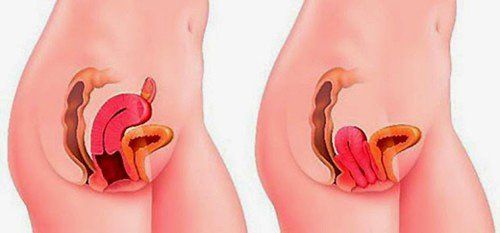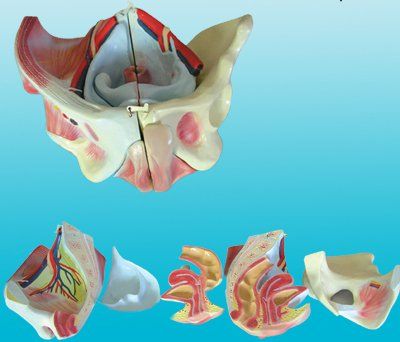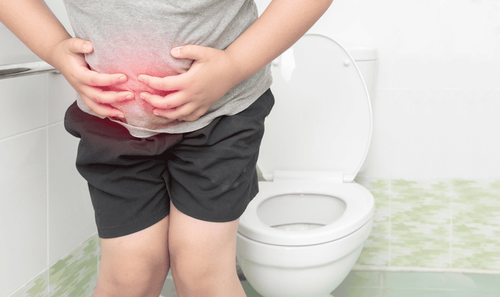This is an automatically translated article.
The article is professionally consulted by MSc, Dr. Trinh Thi Thanh Huyen - Obstetrician and Gynecologist - Department of Obstetrics and Gynecology - Vinmec Hai Phong International General Hospital.Pelvic floor dysfunction after childbirth greatly affects the patient's quality of life, causing many disorders on the pelvic organ systems such as urinary tract, digestive tract, genital tract, decreased sex drive. ,... If not diagnosed and treated promptly, it will cause many dangerous complications on each organ system.
1. What is postpartum pelvic floor dysfunction?
The pelvic floor is made up of many interlocking fascia and muscles, this fascia and muscle mass firmly adheres to the abdominal wall and pubic bone, flanked by the pelvis and hips, behind the lumbar spine, and the sacrum.Pelvic floor is the sum total of 3 organ systems: genital system (uterus, vagina), urinary system (bladder, urethra), lower digestive system (rectum and anus), blood vessels menstruation,..
The duties of the pelvic floor include:
Keep these organs in the correct position, not falling down when working hard or moving. The pelvic floor helps to open and close the urethral openings for normal urination, opening and closing the vagina and anus when needed. Therefore, controlling defecation and urination activities at will. Tasks in sexual and reproductive activities. What is pelvic floor dysfunction? This is a condition in which the pelvic floor muscles are no longer able to contract and relax properly to keep the pelvic floor functions, thus causing disorders in many organ systems: urinary and bowel incontinence, causing constipation, genital prolapse, sexual dysfunction such as pain during intercourse, decreased libido affecting daily activities,...

Rối loạn chức năng sàn chậu có thể gây sa sinh dục
2. Manifestations of pelvic floor dysfunction
Urinating disorders: Urinary incontinence during exertion (laughing, coughing, sneezing, running, carrying heavy objects, urgency, nocturia, frequent urination (>8 times), interval between 2 times < 1 hour, urination) Difficulty pushing, feeling of incomplete urination, bladder prolapse Digestive disorders: prolonged constipation, lower abdominal pain, inability to control defecation, rectal prolapse Genitourinary system disorders such as uterine prolapse , prolapse of the vagina (in women who have had a hysterectomy) Sexual disorders: painful intercourse, decreased libido, sensation Chronic pelvic pain: Pelvic pain, pain in the lower abdomen, region vulva3. Why is pelvic floor dysfunction after childbirth?
Causes of pelvic floor dysfunction after childbirth include:Pregnant women, giving birth many times Menopause causes sex hormone disorders and also causes pelvic floor dysfunction. Pelvic Injuries Vigorous physical activity, especially heavy labor, soon after childbirth Pelvic surgery Nerve damage Factors that increase intra-abdominal pressure such as overweight or obesity, constipation and walking Difficulty digestion and chronic cough There is a family member with pelvic floor dysfunction
4. Diagnosis of pelvic floor dysfunction
Diagnosis is based on clinical and laboratory tests. Depending on the medical condition, the doctor will appoint appropriate tests including:Abdominal ultrasound to evaluate the lifting and holding of the pelvic floor muscles, which takes 15 minutes. Anal sphincter Ultrasound Urine test for infection Pelvic floor electromyography Urodynamic measurement, 30 min. Dynamic MRI of the abdomen and pelvis, when visceral prolapse is accompanied by persistent constipation.

Siêu âm bụng đánh giá độ nâng và giữ của cơ sàn chậu
5. Treatment of pelvic floor dysfunction
Treatments for pelvic floor dysfunction aimed at restoring pelvic floor function include the following:Changing lifestyle habits: eating foods high in fiber to relieve constipation, eat a lot of vegetables and fruits, drink at least 1.5-2 liters of water/day, lose weight if you are obese to reduce pressure on the abdomen In case of pelvic organ prolapse, urinary incontinence, it is necessary to use the Pessary lifting ring. Exercise the pelvic floor muscles according to guided exercises such as practicing with an ultrasound machine, an exercise guide or an electromechanical stimulation to identify the muscle group to be exercised and the object. Bowel and bladder therapy to help control urination In case the above methods are not effective, surgery can be performed. In the above treatment methods, pelvic floor muscle exercises play an important role, helping to restore pelvic floor muscles to improve symptoms. However, this method requires perseverance and requires the guidance of experts.
6. The effect of pelvic floor muscle training
Pelvic floor muscle training helps to prevent and effectively treat 80% of diseases of urinary incontinence, gas leakage, fecal incontinence, nocturia, frequent urination, and control urination at will. Helps prevent prolapse of pelvic organs such as uterus, bladder, and rectum. Prevent and treat urinary incontinence and fecal incontinence for pregnant and postpartum women. Easier labor support. Improves sex drive, increases sexual desire in both women and men. Vinmec International General Hospital is one of the leading prestigious medical centers for reproductive health. Doctors conduct pelvic floor examination after birth according to professional standards, safe, with modern and synchronous equipment; spacious and clean infrastructure; especially a team of qualified and experienced doctors. Pelvic floor examination is one of the steps that Vinmec International General Hospital requires for any woman entering childbirth.Currently, at the Hospital, we are implementing the BASIC Gynecological Examination and Screening PACKAGE, helping customers to detect inflammatory diseases early, so that the treatment process will be easy and inexpensive. It is also possible to screen for early gynecological cancer (cervical cancer) even if there are no symptoms.
Postpartum pelvic floor examination is necessary for women, especially women who give birth vaginally. Postpartum pelvic floor examination helps women understand their own health situation and get timely treatment if problems occur.
If you have a need for consultation and examination at Vinmec Hospitals under the nationwide health system, please book an appointment on the website for service.
Please dial HOTLINE for more information or register for an appointment HERE. Download MyVinmec app to make appointments faster and to manage your bookings easily.













